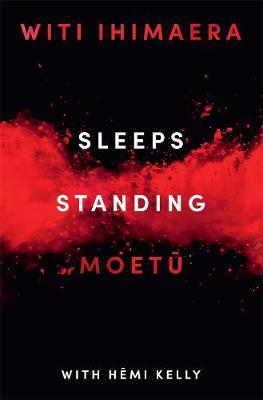"E hoa, ka whawhaitonu mātou, ake, ake, ake!"
"Friend, I shall fight against you for ever, for ever!"
Sleeps Standing / Moetū (Witi Ihimaera and Hēmi Kelly)
 Kia ora readers. What a coup for Te wiki o te Reo Māori this book is.
Kia ora readers. What a coup for Te wiki o te Reo Māori this book is.
A bilingual text in Māori and English, Sleeps Standing / Moetū is written by Witi Ihimaera (Te Whānau a Kai, Te Aitanga a Mahaki, Rongowhakaata, Tuhoe, Whakatōhea, Ngāti Porou) and translated into Te Reo Māori by Hēmi Kelly (Ngāti Maniapoto, Ngāti Tahu-Ngāti Whaoa).
Sleeps Standing / Moetū tells the story of the last battle of the Waikato Wars; the Battle of Ōrākau, 30 March to 2 April 1864. Most New Zealanders know this story as Rewi's Last Stand, immortalised in two films in the early twentieth century, and the later novel by A.W.Reed.
At Orākau on the banks of the Pūniu River in the Waikato, 300 Māori, defended the pa - an agreed place of safety - against 1700 armed British Soldiers, commanded by Lieutenant-General Duncan Cameron.
A third of the defenders were women and children.
They came from the allied tribes of Waikato, Raukawa, Tuhoe, Taranaki, Kahungunu, and Ngati Porou to aid Ngāti Maniapoto, the Tangata Whenua (people of the land). They were led by the great nationalist leader Rewi Manga Maniapoto.
Acknowledging with respect the primary right of Maniapoto to tell this history, a fact that has often been been "trampled all over by historians" (p.87), Witi tells the tale from the point of view of an ancestor of his own Gisborne iwi of Rongowhakaata.
Descended from the great Chief Ruharuhi Rukupō, Moetū whakaaraara (the one who sleeps standing and sounds the alarm), came with other iwi to aid Ngāti Maniapoto against the British.
Many allies were prevented from gaining the pa by the British. The remaining 300 were cut off from water, food and ammunition while facing formidable odds - the British had big guns, they had peach stones and taiaha.
The philosophy of the allied Maori defenders was that if they were to die, it would be in battle. "It came as a forlorn hope with us; no one expected to escape, nor did we desire to; were we not all the children of one parent? Therefore, we all wished to die together." (Hiti Te Paerata, Ngati Te Koihera. p.12).
They lived and died by the warrior's code; defending the land for future generations:
"Me mate te tangata, me mate mō te whenua.
The warrior's death is to die for the land." p.13.
Many question the presence of women and children. The character of Rua Papa explains this on p.87. Rangitira (or royal) families 'travelled together, a sovereign with his court, wife or hoa rangatira and children. If there was a battle, the rangitira families would always be in it, leading from the front. You never saw them sitting on their horses watching from a nearby hillside." (p.87)
Governor Grey promoted his war as 'defensive," persuading Aucklanders to fear invasion and brutal murder.
The truth was the reverse. A prayer book found recently and traced back to Ruapekapeka Marae suggests that during the attack on this pa, the inhabitants had been at Sunday prayer.
As a nation, we have set a date to commemorate the New Zealand Land Wars, beginning 28 October 2017. This decision came directly from submissions to the government about the Battle of Ōrākau. This book acknowledges this decision.
A celebration of the bravery and tenacity of Maori, this wonderful book collects haka, waiata, personal accounts, photographs and maps, as well as Witi's novella. The story is written in Te Reo Māori on the left page and English on the right, enabling the reader to choose to learn from the translated text.



Add a comment to: Sleeps Standing / Moetū by Witi Ihimaera